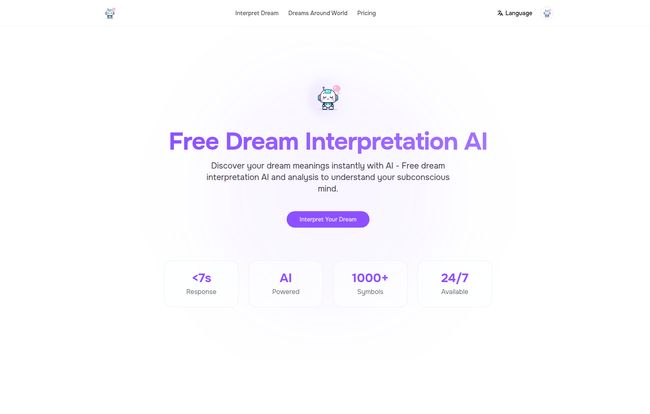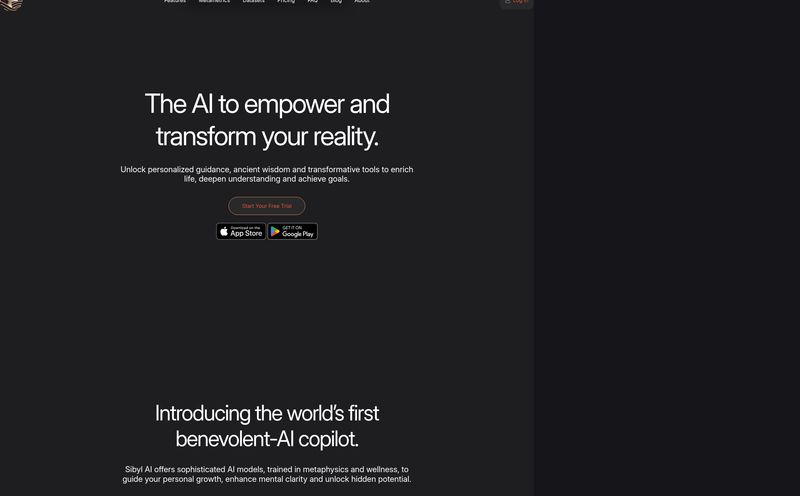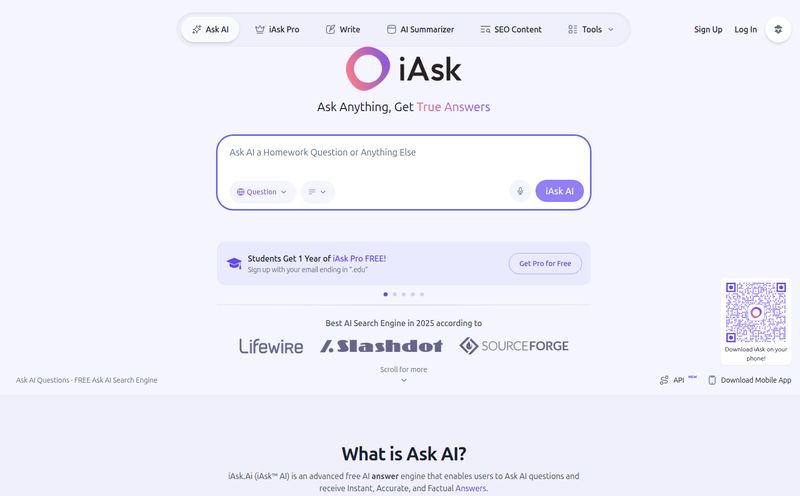You know that feeling, right? You wake up, maybe your heart is pounding a little, and your brain is scrambling to hold onto the bizarre movie it just produced. One minute you’re flying over your childhood home, the next your teeth are falling out (the classic), and then for some reason, your old boss is there, juggling pineapples. You lie there thinking, “What on earth was THAT about?”
For years, decoding that nightly brain-soup was a manual process. You’d either forget it by the time you had coffee, or you’d frantically google “dream meaning of flying but only two feet off the ground.” The results? A mishmash of generic, often contradictory, blog posts. It’s a process that feels more like digital astrology than genuine insight.
As an SEO guy, I spend my days analyzing patterns in data. So, when I stumbled upon Dream Interpretation AI, a platform that claims to use artificial intelligence to decode the subconscious, my curiosity was definitely piqued. An AI for my psyche? A free dream decoder? I had to see for myself if this was just another gimmick or something genuinely useful. So, I poured myself a coffee and decided to feed it one of my weirdest dreams.
So, What Exactly Is This Digital Dream Decoder?
At its core, Dream Interpretation AI is exactly what it sounds like. It’s a tool that takes your written description of a dream and uses AI to provide instant psychological and symbolic analysis. Think of it like a pocket-sized Freudian analyst, but without the couch and the awkward silences.

Visit Dream Interpretation AI
The platform claims to combine advanced tech with traditional dream interpretation methods. It draws from a huge database of symbols, myths, and psychological archetypes (shout out to Carl Jung) to spot patterns and connections that you or I would likely miss. It’s not just giving you a one-liner, either. It offers a few different lenses to look through: modern psychological, spiritual, and even cultural perspectives. This multi-angled approach was the first thing that made me think, okay, there might be something to this.
How It Puts Your Subconscious Under the Microscope
The magic, or rather the method, is in the machine learning models. When you type in your dream—say, “I was in a boat on a calm sea, but the boat was made of bread”—the AI gets to work. It’s not just looking for keywords like “boat” and “sea.” It’s analyzing the relationships between them. A calm sea means something different than a stormy one. A boat made of bread? That’s a whole other level of weird that a simple dream dictionary would choke on.
The AI considers:
- Symbols: The objects, people, and places in your dream.
- Emotions: The feelings you experienced during the dream (scared, happy, confused).
- Narrative: The story or sequence of events.
By cross-referencing these elements with its vast database, it pieces together a potential meaning. It's like having a researcher who has read every book on dream psychology and mythology, and can give you a summary in about 30 seconds. And it’s available 24/7, which is perfect for those 3 AM moments of existential dread after a particularly vivid nightmare.
My Personal Test Drive With a Bizarre Dream
Alright, theory is great, but I had to put it to the test. I decided to use a real, recurring dream I’ve had since I was a kid: I'm in a massive, sprawling library, but all the books are blank. I'm not scared, just… frustrated, trying to find a book with words.
I typed it in, trying to be as detailed as possible about the feeling of the towering shelves and the texture of the empty pages. I hit “interpret,” and within a minute, I had a breakdown.
The Psychological Interpretation
The AI suggested the library represents my mind or my quest for knowledge and self-understanding. The blank books, it explained, could symbolize a feeling of untapped potential, a fear of not having the answers, or even a sense of being overwhelmed by possibilities without a clear direction. It mentioned feelings of “imposter syndrome” or a creative block. Honestly? It hit a little too close to home. Ouch.
The Spiritual Take
Flipping over to the spiritual interpretation, the tone shifted. It framed the blank books not as a lack, but as an invitation. A “tabula rasa” or blank slate, suggesting I have the power to write my own story and that the universe is offering me a fresh start. It was a much more optimistic and empowering take, which I appreciated.
The fact that it could provide both a clinical, psychological view and a more uplifting, spiritual one from the same input was genuinely impressive. It felt less like a machine spitting out a single right answer and more like a tool for reflection, offering different paths for me to consider.
Let's Talk About the Price Tag
Naturally, my next thought was, “Okay, where’s the catch?” As a professional in the online space, I know nothing this cool is ever completely free. And I was right… sort of.
Dream Interpretation AI operates on a freemium model. Here’s the breakdown based on their pricing page:
| Plan | What You Get | Cost |
|---|---|---|
| Free Usage | 2 dream interpretations per day. Store up to 10 dream records. It's enough to get a taste. | $0 |
| Monthly Premium | Unlimited interpretations, unlimited storage, priority support, and access to the full detailed interpretation (the free version gives you a snippet). | $4 for the first month, then $8/month |
So, you can definitely get a feel for the platform without pulling out your credit card. The free plan is generous enough for the casually curious. But if you're a serial dreamer or someone really committed to self-exploration through dream work, the premium plan seems pretty reasonable. For less than the cost of two fancy coffees, you get unlimited access. In my opinion, if the insights are genuinely helping you, that’s a small price to pay.
The Good, The Bad, and The AI
No tool is perfect, so let’s get real. The instant, 24/7 availability is a massive plus. Waking up from a nightmare and getting immediate, coherent feedback is worlds better than doomscrolling through generic websites. The detailed insights and multiple interpretation angles are also fantastic, giving you a well-rounded perspective.
However, it has its limitations. The accuracy is entirely dependent on your ability to recall and describe your dream. If you only remember fragments, the AI won't have much to work with—garbage in, garbage out, as they say. And while it's a powerful tool for self-reflection, it's not a replacement for professional therapy. If you're dealing with serious trauma or mental health issues that are manifesting in your dreams, this AI should be a starting point for a conversation with a human professional, not the final word.
The free usage is also limited, which is standard, but something to be aware of. You might get hooked on the insights and find yourself hitting that paywall after a few days of consistent use.
Is This AI Dream Interpreter for You?
So, who is this for? I’d say it’s perfect for a few types of people.
- The Curious Explorer: Anyone who has ever wondered, “Why do I keep dreaming about being late for an exam I took 10 years ago?”
- Psychology Students: It's a fun, practical tool for seeing concepts like archetypes and symbolism in action. The Michael Chen testimonial on their site seems to back this up.
- Spiritual Seekers: If you believe dreams are messages or hold deeper spiritual significance, the tool provides a framework for that exploration.
- Writers and Artists: Talk about a cure for writer's block! Using dream insights could be a fantastic source of creative inspiration.
Final Thoughts: Is It Worth a Try?
After spending some time with Dream Interpretation AI, I'm walking away pleasantly surprised. It’s far more nuanced and insightful than I expected. It’s not an all-knowing oracle, but it is an incredibly powerful mirror. It reflects your own subconscious data back at you in a structured, analytical way that can trigger some serious “aha!” moments.
Will it solve all your problems? No. But will it give you a fascinating new lens through which to understand the most mysterious part of your day? Absolutely. For the price of free (to start), it’s one of the most interesting applications of AI for personal growth I’ve seen in a long time. Give it a shot—you might be surprised by what your own mind has been trying to tell you.
Frequently Asked Questions
1. How accurate is Dream Interpretation AI?
The site claims a 95% interpretation accuracy. In my experience, its accuracy is highly dependent on the detail you provide. The more specific you are about objects, actions, and feelings, the more precise and insightful the interpretation will be. It's best seen as a tool for guidance rather than an absolute truth.
2. Is my dream data private and safe?
While the platform requires a login for premium features and saving dreams, they generally have a privacy policy in place. However, as with any online service, you should always be mindful of the personal information you share. I'd avoid using real names of people in your life if you're concerned about privacy.
3. What’s the main difference between the free and premium versions?
The biggest differences are volume and depth. The free version limits you to 2 interpretations per day and only shows you a preview of the analysis. The premium version gives you unlimited interpretations, unlimited cloud storage for your dream journal, and access to the full, in-depth analysis for every dream.
4. Can it interpret nightmares or recurring dreams?
Yes, absolutely. In fact, that's one of its strengths. For nightmares, it can help deconstruct the frightening symbols into understandable psychological concepts. For recurring dreams, it can identify the core themes and potential unresolved issues your subconscious keeps bringing to your attention, just like it did with my library dream.
5. Can I cancel my premium subscription at any time?
According to their website, all plans include automatic renewal but can be canceled at any time. This is a standard practice for most subscription services, allowing you to opt-out if you no longer find it useful.



